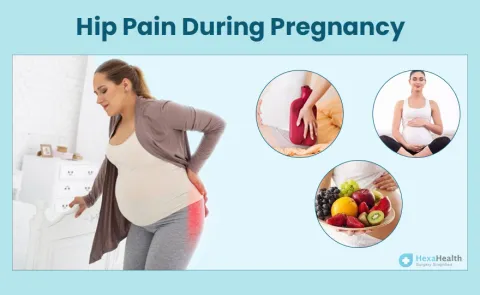When does Constipation in Pregnancy Start? - What to Expect

Quick Summary
- Constipation is a common problem during pregnancy.
- It can be caused by hormonal changes, decreased physical activity, and changes in diet.
- Constipation can be treated with lifestyle changes and medications.
Pregnancy often gives rise to a number of changes in the body, and constipation is one of them. It can be an extremely uncomfortable condition and can be caused by different reasons. Constipation in pregnancy has been a common issue amongst women but can be treated to reduce its effects.
One can easily spot the symptoms and identify the condition of constipation during pregnancy. While it can make one feel bloated, constipation can be cured with easy-to-follow lifestyle routines and certain medications. To know more, keep reading!What is Constipation During Pregnancy?
Constipation is a common gastrointestinal problem that affects many people, including pregnant women. Constipation during pregnancy is defined as infrequent bowel movements, typically fewer than three times per week, with difficulty passing stools.
Most women tend to experience constipation during the third trimester because of the weight of the foetus and the pressure that it exerts on one’s bowels. However, constipation problem in pregnancy can occur anytime and also last for some time after childbirth.
It is essential to manage constipation during pregnancy because it can also lead to complications such as anal fissures or faecal impaction.


Causes of Constipation in Pregnancy
The issue of constipation during pregnancy for women can be different as there are several factors that contribute to this. Here are some possible causes of constipation during pregnancy:
- Hormonal changes: Throughout pregnancy, the body’s hormone levels rise, especially progesterone. This hormone can cause the muscles in the digestive tract to relax, leading to the slowed transit time of food through the intestines. This can lead to constipation problem in pregnancy.
- Increased pressure on the intestines: The enlarged uterus often puts pressure on the intestines. This can make food move more slowly through the digestive tract, resulting in constipation.
- Iron supplements: Pregnant women are frequently given iron supplements to help avoid iron deficiency anaemia. These supplements, however, might induce constipation problem during pregnancy since they slow down the digestive system.
- Lack of exercise: Exercise helps to stimulate the digestive system, promoting regular bowel movements. However, many pregnant women may be more sedentary due to fatigue or discomfort, leading to constipation.
- Dehydration: Pregnant women need to drink plenty of water to stay hydrated. When the body is dehydrated, the stool can become hard and difficult to pass, leading to constipation.
- Changes in diet: During pregnancy, many women may experience changes in their appetite or aversions to certain foods. This can lead to a diet that is low in fibre, which can contribute to constipation.
- Anxiety or Stress: Pregnancy can be a stressful time, and anxiety or stress can affect the digestive system, leading to constipation.
- Pre-existing digestive issues: Women who have pre-existing digestive issues, such as irritable bowel syndrome (IBS) or inflammatory bowel disease (IBD), may be more likely to experience constipation during pregnancy.
Symptoms of Constipation During Pregnancy
Sometimes, it can be hard to tell if one is suffering from constipation because the symptoms are similar to those of normal pregnancy. However, experiencing severe discomfort, pain in the bowel region or difficulty in passing stool must be taken up with the doctor for the right course of treatment. Below are some of the most highlighted symptoms of constipation during pregnancy:
- Infrequent bowel movements: A decrease in the frequency of bowel movements is a common symptom of constipation during pregnancy. Typically, if a person has less than three bowel movements per week, they may be considered constipated.
- Difficulty Passing Stools: Constipated individuals may experience pain, discomfort, or straining when attempting to pass stools. It is one of the most common symptoms of constipation.
- Hard or Lumpy Stools: Stools that are hard or lumpy may be a sign of constipation. These types of stools can be difficult to pass, and they may cause discomfort or pain. Higher levels of progesterone can decrease the activity of one’s bowel movement, giving the body more time to absorb the required nutrients. This can make the stool dry out due to lack of moisture and make it harder to pass as poop.
- Bloating: Constipation problem in pregnancy can cause abdominal bloating, which may make a person feel uncomfortably full or gassy. While bloating, to some extent is normal during pregnancy, prolonged gastric issues must be diagnosed in time.
- Abdominal Discomfort: Constipation in pregnancy can cause discomfort or cramping in the abdomen as well. This can also be a result of gas buildup, but prolonged pain or discomfort calls for a dedicated consultation.
- Rectal Discomfort: Individuals with constipation may experience discomfort or pain in the rectum. The primary reason behind increased rectal discomfort is often caused by hard stool.
- Anal Fissures: Straining during bowel movements can cause small tears in the skin around the anus, which can be painful and may cause bleeding.
Constipation in Pregnancy Treatment
During pregnancy, constipation is a common problem. This is due to hormonal changes that slow down the digestive system and the pressure of the growing uterus on the rectum. To prevent or manage constipation during pregnancy, women can make some lifestyle changes such as drinking plenty of water, eating a high-fibre diet, and exercising regularly. Here are some ways to cure constipation during pregnancy:
- Increase fibre intake: Fibre-rich meals such as fruits, vegetables, whole grains, and legumes can help bulk up your stool and promote bowel motions. At least 25-30 grams of fibre per day is recommended.
- Stay hydrated: Consuming enough water and drinks like fresh fruit juices can aid in the softening of the stool and the ease of bowel movements. Women should drink 8-10 glasses of water every day. This will eventually turn the hardened stool soft and help in smoothing the bowel movement.
- Exercise: Regular physical activity can help stimulate bowel movements and improve digestion. One should try to include at least 30 minutes of moderate exercises, such as walking, swimming, or yoga, into the daily routine.
- Use stool softeners and laxatives: If natural remedies do not work, one may need to take a stool softener, laxatives or a fibre supplement, such as psyllium husk or methylcellulose. These products can help soften the stool and make it easier to pass. It is important to use laxatives only as directed by a seasoned doctor, as some laxatives may be harmful to the foetus.
- Avoid certain foods: Certain foods can worsen constipation, including processed foods, dairy products, fried and fatty foods, and refined carbohydrates. Avoiding these foods can help improve one’s digestion.
- Try herbal remedies: Some herbal remedies, such as senna tea or flaxseed oil, can help relieve constipation during pregnancy. However, it is important to talk to a doctor before using any herbal remedies, as some may not be safe for pregnant women.
One can also explore effective home remedies for constipation in pregnancy to improve bowel movement. The treatment for constipation during pregnancy depends on the severity of the condition, the woman's health, and the underlying cause. However, with the right consultation and treatment, it can be cured.
Takeaway
Constipation in pregnancy is a common gastrointestinal problem. It is characterised by infrequent bowel movements, typically less than three times per week, with difficulty passing stools. Hormonal changes that slow down digestion and pressure from the expanding uterus on the intestines can cause constipation. Other causes include iron supplements, lack of exercise, dehydration, changes in diet, anxiety or stress, and pre-existing digestive issues.
The most evident symptoms of constipation during pregnancy include infrequent bowel movements, difficulty passing stools, hard or lumpy stools, bloating, abdominal discomfort, rectal discomfort, and anal fissures. However, you can manage or prevent constipation by increasing your fibre intake, staying hydrated, exercising regularly, and following a healthy diet.
At HexaHealth, we have rich experience in dealing with women's health, pregnancies, and advanced surgical intervention. We can help you navigate through the issues of constipation in pregnancies and lead you on the right path. Speak to our expert teams today and get a dedicated consultation with ease!
Frequently Asked Questions
Is constipation in pregnancy common?
Yes, constipation is often a common condition during pregnancy. It tends to affect over 16 to 39% of pregnant women at least once before the delivery of the child. While it is most common to occur in the third trimester, you can be constipated anytime.
Is it normal to have constipation during pregnancy?
Experiencing constipation during pregnancy, to a certain extent, is completely normal. With the right diet, regular exercises and effective medication, your constipation can be completely cured.
When does constipation in pregnancy start?
While you can experience constipation anytime during the pregnancy, it is most common in the third trimester. This is primarily because of the heavy weight of the foetus, which can interfere with bowel movement.
Is constipation a sign of pregnancy?
Experiencing frequent constipation can hint at pregnancy, but it is not a direct sign of it. You should turn to more credible ways like a pregnancy test to make sure of the pregnancy.
Do you get constipated at 2 weeks pregnant?
Constipation during pregnancy can start during the second or third month for women. This is dependent on when the progesterone hormone increases in the body, which causes the functioning of your intestines to relax.
Are constipation and pregnancy-related?
Pregnancy can often cause constipation in women due to an increase in the progesterone hormone. Nevertheless, the condition can be cured with the right treatment and a fibre-rich diet.
What does constipation in early pregnancy feel like?
Constipated women are likely to experience irregular bowel movements or hard stool which can be painful and frustrating. Frequent bloating or pain in the abdomen can also be the result of constipation.
What causes constipation problems during pregnancy?
The most common cause of constipation in pregnancy is the increase of progesterone hormone in women. Other reasons can include dehydration or additional pressure on the intestines.
What are the signs and symptoms of constipation problems in pregnancy?
Having hard stool or excessive bloating can be the most evident signs of constipation in pregnancy. You can have irregular bowel movements, abdomen or stomach pains or find it difficult to pass stool during this condition.
How is constipation during pregnancy diagnosed?
If you complain of prolonged difficulty in passing stool, have abdominal pain, or experience irregular bowel movement, your doctor is likely to diagnose the condition of constipation during pregnancy.
What to do if I am constipated for 5 days while pregnant?
It is best to consult with a doctor to gauge the underlying reason for being constipated. They are likely to prescribe you the most suitable medication or stool softeners that can aid your condition. Improving your diet and including daily exercising while being hydrated can also help you.
Is constipation in pregnancy preventable?
Having a fibre-rich diet and exercising regularly can prevent the risks of getting constipation problem during pregnancy. Your doctor may also advise on taking fibre supplements to improve your bowel system.
How can I reduce my risk of becoming constipated during pregnancy?
Make sure to stay hydrated throughout your pregnancy to avoid constipation. An active lifestyle with frequent exercising can also help in keeping your bowel movement in place.
Can constipation hurt the baby during pregnancy?
While constipation can be an uncomfortable experience for you, it is very unlikely to affect your baby. The weight of your foetus can hamper your bowel movement, but it has no significant impact on the health of your baby.
What is constipation treatment in pregnancy?
Laxatives can be the first line of treatment that can help you treat constipation problem in pregnancy with ease. Using stool softeners can also make it easier for you to pass stool.
What are the home remedies for constipation in pregnancy?
Including fibre-rich food like fruits and vegetables can be effective in treating constipation in pregnancy. Exercising daily and staying hydrated can also be a helpful remedy.
How to instantly relieve constipation in pregnancy?
Constipation during pregnancy can be relieved as soon as you poop the stool. Using a softener can be helpful in easing the situation. Drinking water consistently is also likely to improve your constipation issue.
How to cure constipation in pregnancy completely?
Controlling your hormones and using stool softeners can help you cure constipation in pregnancy permanently. Treating your dehydration is also effective in making the condition better.
What is more common in pregnancy: constipation or diarrhoea?
Constipation is one of the most common conditions in pregnancy, which arises due to an increase in hormones. Additionally, diarrhoea can also be an issue during pregnancy caused due to hormonal or diet changes.
What medications can I take to relieve constipation when I’m pregnant?
It is best to consult with your doctor to understand which laxative is safe for you and your baby for treating constipation during pregnancy. Certain stool softeners can also be leveraged to improve your situation.
When can I expect constipation to end while I’m pregnant?
It is likely that your constipation issues are resolved after childbirth. However, in some cases, you may still experience constipation until three months after your child is born.
How to relieve constipation in pregnancy?
Drink plenty of water, eat high-fiber foods, exercise regularly, try bowel movements at the same time each day, and talk to a doctor before using any laxatives or stool softeners can help relieve constipation problem during pregnancy.
What is constipation in pregnancy?
Constipation in pregnancy is a common condition where bowel movements become infrequent or difficult due to hormonal changes, pressure on the intestines, and iron supplements.
Last Updated on: 9 March 2023
Reviewer

A specialist in Obstetrics and Gynaecology with a rich experience of over 21 years is currently working in HealthFort Clinic. She has expertise in Hymenoplasty, Vaginoplasty, Vaginal Tightening, Labiaplasty, MTP (Medical Termination...View More
Author

An enthusiastic writer with an eye for details and medical correctness. An avid reviewer and publisher. She emphasises authentic information and creates value for the readers. Earlier, she was involved in making ...View More
Expert Doctors (10)
NABH Accredited Hospitals (6)
Latest Health Articles




























